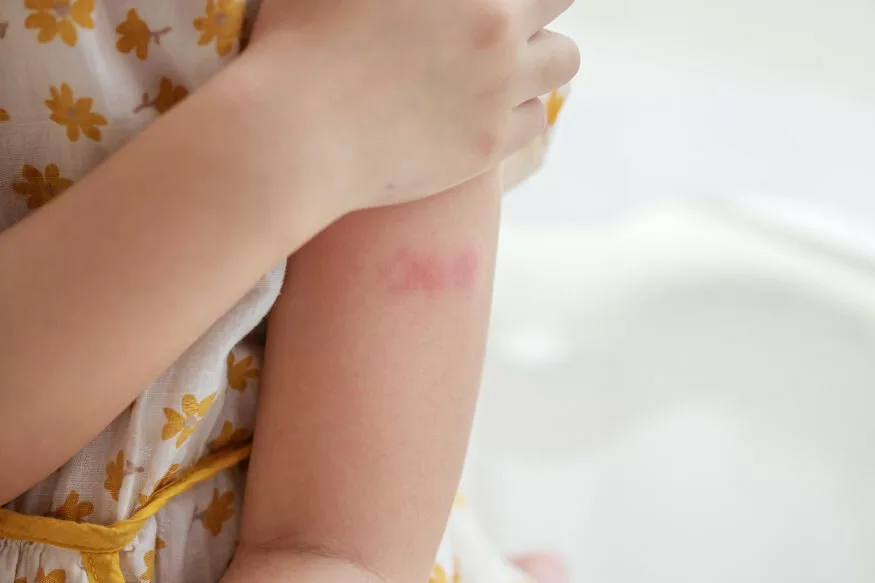Baby skin care is extremely essential as it’s delicate and requires very special attention. To keep your baby’s skin soft, smooth, and rash-free, you should always select gentle and hypoallergenic skincare products. Maintain proper hygiene, use mild soaps during bath time, and moisturise as needed. Avoid excessive scrubbing and harsh fabrics, and dress your baby in breathable, loose-fitting clothing. By adopting a well-rounded skincare routine, you can ensure your baby’s skin remains healthy and comfortable.
Babies have delicate skin that can be prone to rashes, which can be concerning for parents. In this comprehensive guide, we will delve into the diverse causes, effective skin rashes treatment options, and practical prevention tips for those pesky infant skin rashes. Gaining insights into these aspects will enable parents to provide the best possible care for their precious babies, ensuring that their skin stays soft, smooth, and rash-free.
Also Read: Boosting Kids Immunity with Strawberries
Understanding the Causes of Infant Skin Rash
Various factors can contribute to infant skin rashes, and pinpointing the underlying cause is vital for effective skin rashes treatment and prevention. These are some common reasons behind these different types of rashes:
- Irritation and Friction: Skin irritation can stem from friction caused by clothing, rough fabrics, or harsh detergents. This irritation often results in redness and discomfort for the baby.
- Diaper Rash Woes: Diaper rash is a familiar concern for parents. It usually results in red, irritated skin around the diaper area and is caused by extended contact with wet diapers.
- Allergic Reactions: Babies can be sensitive to allergens such as certain foods, lotions, or laundry detergents. These allergic reactions may manifest as skin rashes, causing discomfort.
- Heat-Induced Rashes: Heat rash is a common occurrence among babies, especially in warm weather. It is distinguished by small red pimples on the skin’s surface, often due to plugged sweat ducts.
- Problems Caused by Acne: Atopic dermatitis, often called infantile eczema, is a persistent skin condition that emerges as dryness, itching, and skin irritation.
Also Read: Healthy Snacking with Dried Fruits for Kids
Effective Treatment for Infant Skin Rashes
While treating infant skin rashes, it’s essential to consider the rash on the baby’s skin type and its cause. Here are some general guidelines for effectively managing and treating these rashes:
- Prioritise Baby’s Skin Hygiene: Maintaining proper skin hygiene is crucial for managing most infant rashes on the body. Delicately cleanse your baby’s skin with a mild, fragrance-free soap and lukewarm water. It’s important to remember not to vigorously scrub the skin to avoid worsening irritation.
- Diaper Rash Care: For diaper rashes, frequent diaper changes are a necessity. Utilize a gentle diaper cream or ointment to establish a protective barrier that shields the skin from excess moisture.
- Identify and Eliminate Likely Culprits: If you suspect an allergy is triggering the rash, make efforts to identify and remove potential culprits. This may entail modifying your baby’s diet or steering clear of specific skincare products that could be causing irritation.
- Maintaining Ideal Skin Hydration: To prevent and address skin rashes in your baby, ensuring their skin stays well-hydrated is crucial. It’s essential that you regularly moisten your baby’s skin because dehydration may worsen skin conditions. Choose a hypoallergenic, fragrance-free moisturiser and use it as needed to keep your skin feeling smooth and pleasant.
- Consult a Paediatrician for Medical Intervention Advice: They may provide medical therapies for rashes in certain situations. For fungal rashes, they might recommend antifungal creams, or for eczema, hydrocortisone creams.
Also Read: Common Skin Infections In Children: Symptoms and Treatment
Practical Prevention Tips for Infant Rashes on the body
Preventing infant skin rashes is often more manageable than treating them. Here are some precautionary tips to help you maintain your baby’s skin comfort and health, reducing the risk of rash on your baby’s skin:
- Make a Skin-Friendly Diaper Choice: Choose hypoallergenic diapers that are free of harsh chemicals and unpleasant smells. Be diligent about changing diapers promptly to prevent diaper rash.
- Gentle Cleansers and Detergents: Select mild, fragrance-free soaps for your baby’s bath and opt for gentle detergents for their clothing. It’s essential to avoid the use of fabric softeners and harsh laundry products.
- Regulate Room Temperature: Heat rashes can be avoided by keeping a room at a reasonable temperature, particularly in warm weather. To help prevent overheating, clothe your infant in loose-fitting, breathable items.
- Choose to Breastfeed: When feasible, breastfeeding your child can help lower their risk of allergies and eczema while also providing vital nutrition. It’s a fantastic method to promote the general health and wellbeing of your infant.
- Set priorities Skin Hydration: Use hypoallergenic creams or ointments on a regular basis to keep your baby’s skin hydrated. By avoiding rashes caused by dry skin, this practice can help keep your baby’s skin smooth and irritation-free.
- Stay Alert for Allergies: If you suspect your baby has allergies, seek guidance from a paediatrician on potential allergens to avoid.
- Seek Medical Advice: If a rash persists or worsens despite home care efforts, it’s essential to consult with a paediatrician. They can provide a proper diagnosis and recommend an appropriate skin rashes treatment plan.
Also Read: Children’s Illnesses: Which Ones Are Contagious?
Exploring Different Types of Infant Rashes on the Body
Recognizing the variety of rashes that can affect your baby’s skin is fundamental. Familiarise yourself with these common rashes:
- Contact Dermatitis: This rash occurs due to contact with irritants like chemicals or fabrics, leading to redness, itching, and potential blistering.
- Cradle Cap: Cradle cap presents as a crusty, flaky rash on the baby’s skin specifically on the scalp. It’s a benign condition that can be addressed through gentle washing and moisturising.
- Baby Acne: Baby acne usually manifests as small red or white bumps on the face and is typically benign, often resolving without skin rashes treatment.
- Impetigo: Impetigo is a bacterial skin infection that results in painful, pus-filled sores. Antibiotic therapy and medical attention are necessary.
- Rashes: Allergies or other factors can cause itching, which are red, raised, and irritating welts. They are usually temporarily going away within a few days.
To ensure the well-being of their precious little ones, parents should strive to gain a thorough grasp of the origins, methods of treatment, and strategies for prevention when it comes to infant skin rashes. By identifying potential triggers, employing suitable treatments, and embracing preventive measures, parents can keep their baby’s delicate skin soft, supple, and devoid of any troublesome rashes. Remembering that every baby is an individual is important. Getting personalised help from a paediatrician while dealing with skin rashes is not only a wise decision but also a caring one.
EuroSchool prioritises the well-being of children, and this includes addressing common concerns like infant skin rashes. Baby’s comfort and health are of paramount importance, and our blog on baby’s skin rash causes, treatments, and prevention tips offers valuable insights for parents. It’s critical to understand and comprehend the different types of rashes, their causes, and the best remedies to treat and prevent them. We are dedicated to supporting parents and carers in fostering their children’s overall health and happiness, and our blog’s content reflects that. We are committed to holistic child development, which includes boosting their health.
Disclaimer: The information provided on this website is not a substitute for professional medical advice. EuroSchool encourages you to consult with a qualified healthcare professional for any health concerns you may have. The information on this website is not intended to diagnose, treat, cure, or prevent any disease.










